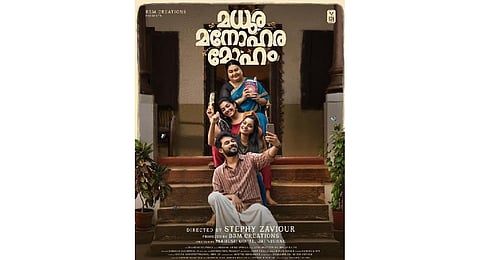

The name, Cinema Paradiso Club (CPC), should be familiar to many Malayali cinephiles owing to the popularity of this Facebook cinema community’s close association with the Malayalam film industry.
Some members of the group have already transitioned to filmmaking. The latest addition is actor and scenarist Jai Vishnu, who makes his full-fledged screenwriting debut with Madhura Manohara Moham, a satire on upper-caste Hindu families, which he co-wrote with Mahesh Gopal.
The duo’s collaboration materialised while being members of CPC, owing to a sync in temperaments and sensibilities. While Jai, a Pathanamthitta-based former fashion company executive, quit his job when cinema came calling, the Kollam-based Mahesh continues to work as a bank employee while pursuing screenwriting dreams.
Madhura Manohara Moham isn’t a perfect film—the second half is relatively more interesting than the first—but picking the brains of screenwriters with different thought processes and expectations is an activity worth engaging in. Both Jai and Mahesh anticipated the varied responses to the film, and they concur with the assessment of the second half, in particular. That said, they held on to their confidence in what the second and third acts of the film had to offer.
“We knew that some people would react in a certain way to the first half, but we also hoped that when audiences leave the theatres, the film’s latter portions, especially the ending, would linger in their minds for a while,” says Jai, who, along with Mahesh, looked to the format of successful mainstream entertainers such as, say, Drishyam for inspiration.
“These films have this format where they take a while to establish the characters and setting in the first half. We could’ve integrated a pivotal element at the 20-min mark, but then the audiences might later feel that they’re being dragged. It is not, after all, a short film, and we had to consider the time duration management. There are those for whom the first half worked, and we are fine with both kinds of reactions.”
Adding to Jai’s points, Mahesh recalls that the earlier drafts didn’t have the caste angle. He shares that the script presented opportunities for mining humour when they thought of a young woman who isn’t concerned with caste and religion having a mother and elder brother who feel the opposite. “It helps that Jai is familiar with the milieu, and when we discussed locations, placing this story in Pathanamthitta seemed a more logical choice,” he says.
“And as for the reaction to the ‘aimless first half’, we expected mixed responses. We were perfectly aware that our story actually begins just a little before the interval arrives, and once it picks up from there on, it traverses a straight line till the end. One interesting element we brought in was having a particular character remain secondary in the first half, and becoming a dominant character when the twist occurs midway, whereas, in the first half, it’s someone else getting more screen time. After this development, audiences have something to look forward to.”
When asked if they wrote the script with a family audience in mind, Jai replies that that wasn’t necessarily the case. “We knew it would work for them—that was a given—but we also thought of the possibility of some elements working for the youth audience. Most often, we see that family audiences increase in strength in the second week and third weeks as opposed to the younger audiences who watch these films on the initial days. So when we conceived this idea, we had an unbiased approach in mind.
Usually, when we talk about gender equality, it’s always one-sided. After all, we are talking about the emotions of human beings in this film, and the consideration is that a character is a ‘human being’, not whether they are a man or a woman. I strongly feel we should stop discussing these things in terms of a ‘man did this’ or a ‘woman did that’ and reflect more on what human beings generally do. Not doing that can create unnecessary arguments. You know, I see my male and female friends the same way. For the content to look fresh, we should approach something from all angles.”
Since Mahesh was an equal contributor, the writing process involved either of them developing a scene and then the other adding an element later to enhance it further. “It was a vice versa process,” says Mahesh. “Maybe a writer can do this solo, but it wouldn’t have been as funny or gotten better. In the case of Madhura Manohara Moham, I felt everything worked out because both of us decided to sit down and brainstorm ideas.”
Approaching director Stephy Zaviour—a seasoned costume designer making her debut behind the camera—was not, Jai says, a planned move. To make a long story short, it was an organic process which happened when Jai and Mahesh discussed casting Rajisha Vijayan in an integral role.
“The director’s gender is irrelevant here,” says Jai. “We were particular from the outset that we had to approach this material in a way that doesn’t probe the reasons for a particular’s toxic behaviour. It was not important. Certain characters don’t require explanations.
That’s the old filmmaking approach; it wouldn’t work today. We also didn’t want to resort to preaching. It wouldn’t work if we only thought of pleasing that one per cent that, on social media, talks about what is correct or not. Ultimately, the idea is to entertain—and show this is how some people are. Of course, we do express our politics in a nuanced manner, but creating a revolution wasn’t our end goal. When people laugh at these characters, we know we have achieved what we intended. I don’t believe cinema is a medium to advise anyone.”
Writers Jai Vishnu and Mahesh Gopal on collaborating for Madhura Manohara Moham, which marked the directorial debut of costume designer Stephy Zaviour, and featuring Sharafudheen, Rajisha Vijayan, Bindu Panicker, and Saiju Kurup in major roles